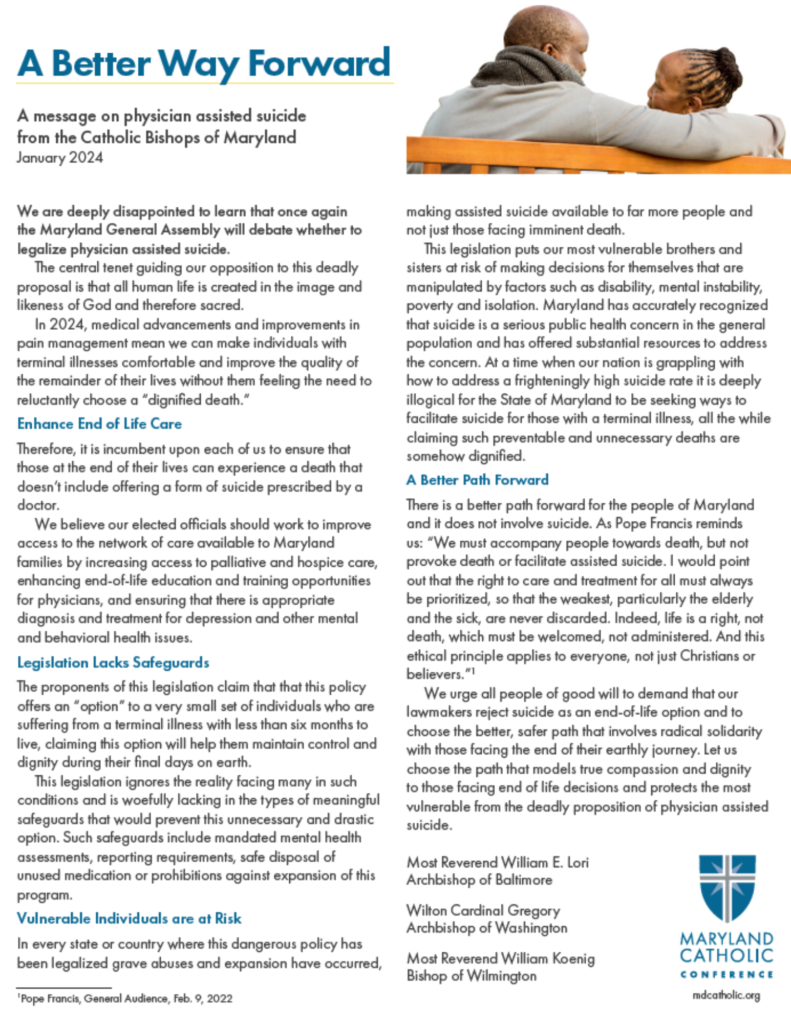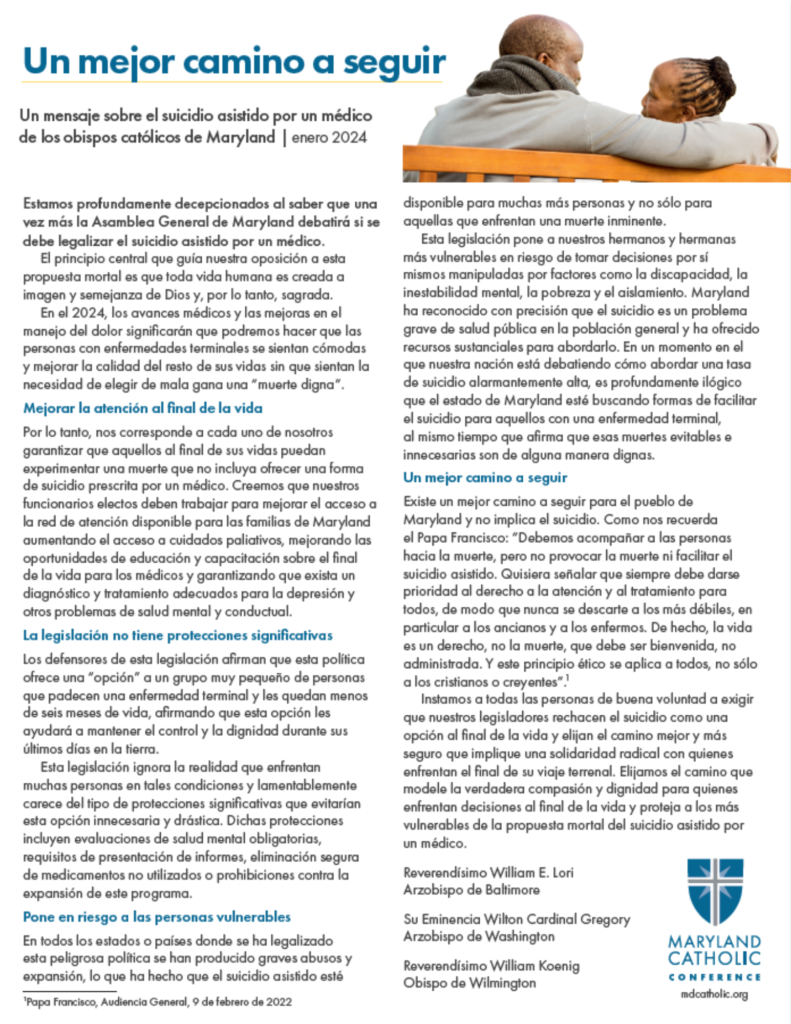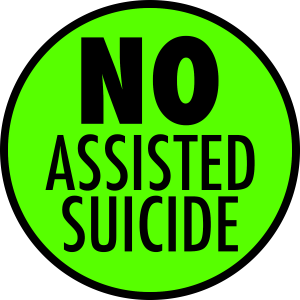Physician Assisted Suicide is Wrong for Delaware and Maryland

The bill to legalize physician-assisted suicide, has passed the Delaware House and now moves to the State Senate.
ACTION ALERT! HB 140 that legalizes assisted suicide in Delaware being considered in the State Senate.
Efforts on the part of the Catholic community, other faith groups, medical professionals, Saint Francis Hospital, advocates for persons with disabilities, and others, kept this legislation from becoming law in past legislative sessions. We need to do so again. You can play an important role by contacting your State Senator and urging them to oppose this bill and to vote “no” should it come before the Senate. Use the link below to send an email to your State Representative.
Our opposition is rooted in the Church’s belief in the sanctity of life from conception to natural death and the dignity of the individual, both of which are objective and non-negotiable truths and principles of our faith.
As Pope Francis reminds us: “We must accompany people towards death, but not provoke death or facilitate assisted suicide. I would point out that the right to care and treatment for all must always be prioritized, so that the weakest, particularly the elderly and the sick, are never discarded. Indeed, life is a right, not death, which must be welcomed, not administered. And this ethical principle applies to everyone, not just Christians or believers.”[i]
In addition to our well-founded, faith-based concerns, there are a number of other concerns to consider:
- House Bill 140 would fundamentally change Delaware’s legal approach to medical ethics, medical practice, and health care decision-making. The Psychiatric Society of Delaware, the American Medical Association and the American College of Physicians also oppose involving practitioners of the healing arts in the intentional ending of a person’s life by medically assisted suicide, also known as medical aid in dying.
- In Colorado, patients who suffered from Anorexia Nervosa, which is a mental illness, not a terminal illness if treated, were provided access to physician-assisted suicide.
- In Oregon, a report available on their legislature’s website stated that that “any patient is eligible for assisted suicide as long as their condition will reasonably lead to death in the absence of any medical intervention.” The report goes on to say that “The latest Death with Dignity Act Summary confirms this interpretation as it includes cases of patients qualifying for assisted suicide due to typically non-terminal diseases including arthritis, complications from a fall, hernia, sclerosis, and stenosis.”
- In Canada, the nation most like ours in the world, patients need no longer be terminally ill as a matter of law. Additionally, mental illness has become legally permitted as the sole underlying condition for those seeking physician-assisted suicide.
You can get more information about the dangers of physician assisted suicide at //cdow.org/stopassistedsuicide.
“We urge all people of good will to demand that our lawmakers reject suicide as an end-of-life option and to choose the better, safer path that involves radical solidarity with those facing the end of their earthly journey. Let us choose the path that models true compassion and dignity to those facing end of life decisions and protects the most vulnerable from the deadly proposition of physician assisted suicide.”[ii]
Please contact your State Senator today and urge to reject Physician Assisted Suicide. Click here.
[i] Pope Francis, General Audience, Feb. 9, 2022
[ii] Most Reverend William E. Lori Archbishop of Baltimore, Wilton Cardinal Gregory Archbishop of Washington and Most Reverend William Koenig Bishop of Wilmington. A Better Way Forward, January 2024 (see below)


Click here to download the message.
Click here to help the fight against physician-assisted suicide in Maryland.

By Dr. Michael T. Vest
CARDINAL O’MALLEY ON ASSISTED SUICIDE
As the Massachusetts legislature considers physician-assisted suicide, Cardinal O’Malley, OFM Cap., Archbishop of Boston, responded in the Boston Globe.
LAWSUIT AGAINST CALIFORNIA ASSISTED SUICIDE LAW
A lawsuit has been filed in federal court against California’s assisted suicide law for discrimination against people with disabilities. More information can be found on the plaintiffs’ website.
Join the Maryland Healthcare Coalition Healthcare professionals throughout Maryland know the dangers of legalizing physician-assisted suicide. Join the many medical, behavioral, hospice and other healthcare providers in Maryland who are standing against PAS. Click here.
Every Life is Worth Living
Heavenly Father, thank you for the precious gift of life. Help us to cherish and protect this gift, even in the midst of fear, pain, and suffering. Give us love for all people, especially the most vulnerable, and help us bear witness to the truth that every life is worth living. Grant us the humility to accept help when we are in need, and teach us to be merciful to all. Through our words and actions, may others encounter the outstretched hands of Your mercy. We ask this through Christ, our Lord. Amen.
Every Life is Worth Living, © 2015, United States Conference of Catholic Bishops, Washington, DC. All rights reserved.
Some of the national organizations who have released statements in opposition to the practice of physician-assisted suicide:
National Council on Disability
National Spinal Cord Injury Association
Association for Persons with Severe Handicaps (TASH)
Click here to read, “To Live Each Day With Dignity: A Statement on Physician-Assisted Suicide” from the USCCB.
Click here for more from the USCCB.
In 2020, the Vatican’s Congregation for the Doctrine of the Faith released the letter
Samaritanus bonus, “on the care of persons in the critical and terminal phases of life.”
The letter reaffirms the Church’s teaching on care for those who are critically ill or dying
and offers additional pastoral guidance for increasingly complex situations at the end of
life. For a brief overview of key points from this important document
with a specific focus on what it says about palliative care and hospice, click here.
